Dump Truck Rental Market
Dump Truck Rental Market Size and Share Forecast Outlook 2025 to 2035
Dump truck rental market is projected to grow from USD 6.5 billion in 2025 to USD 9.2 billion by 2035, at a CAGR of 3.5%. Rigid will dominate with a 45.0% market share, while 20-40 t will lead the payload segment with a 45.0% share.
Dump Truck Rental Market Forecast and Outlook 2025 to 2035
The global dump truck rental market is projected to grow from USD 6,500.0 million in 2025 to approximately USD 9,200.0 million by 2035, recording an absolute increase of USD 2,700.0 million over the forecast period. This translates into a total growth of 41.5%, with the market forecast to expand at a compound annual growth rate (CAGR) of 3.5% between 2025 and 2035.
The overall market size is expected to grow by nearly 1.4X during the same period, supported by increasing construction activities across emerging economies, growing demand for specialized heavy equipment rental services, and rising preference for rental models over equipment ownership across various construction and mining applications.
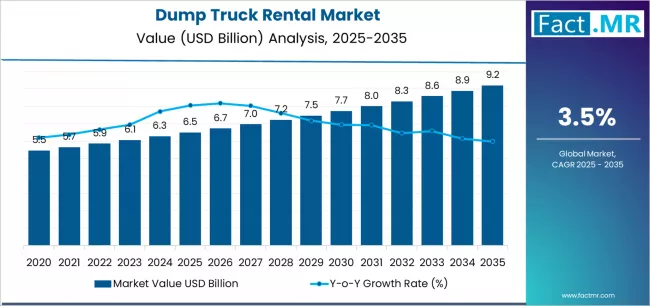
Quick Stats for Dump Truck Rental Market
| Dump Truck Rental Market Value (2025) | USD 6,500.0 million |
|---|---|
| Dump Truck Rental Market Forecast Value (2035) | USD 9,200.0 million |
| Dump Truck Rental Market CAGR | 3.5% |
| Leading Segment by Type (2025) | Rigid (45.0%) |
| Leading Segment by Payload (2025) | 20-40 t (45.0%) |
| Leading Segment by End Use (2025) | Construction (55.0%) |
| Key Growth Regions | Asia Pacific, North America, and Europe |
| Top Companies by Market Share | United Rentals, Sunbelt, Herc |
Heavy-duty hauling defines modern construction economics. A single 40-ton rigid dump truck costs $400,000 new, burns 50 gallons of diesel daily, and requires a Commercial Driver's License operator earning $75,000 annually. Most contractors need this capacity sporadically - three weeks during foundation excavation, then idle for months. Rental transforms this capital burden into operational flexibility.
Rigid chassis designs capture 45% of rental demand because they handle punishment better than articulated alternatives. Highway-legal weight limits restrict payloads to 40 tons, but rigid frames distribute stress more effectively across rocky terrain and uneven job sites. The steel construction withstands impacts that would crack fiberglass articulated joints. Maintenance becomes predictable - hydraulic cylinders, not complex pivot mechanisms.
The 20-40 ton payload segment dominates through versatility across project sizes. Smaller trucks struggle with productivity on major earthmoving contracts. Larger units exceed weight limits or prove too expensive for residential work. This sweet spot matches excavator bucket capacities - a 3-cubic-yard excavator loads a 25-ton truck in four passes without overloading or underutilizing either machine.
Construction accounts for 55% of rental activity, but mining creates the most profitable contracts. Surface mining operations rent entire fleets for 2-3 year terms, paying $8,000 monthly per truck versus $800 daily construction rates. These long-term agreements enable rental companies to invest in specialized mining configurations with reinforced beds and extended warranties.
Operator availability constrains growth more than equipment supply. CDL Class B licenses require specific training and clean driving records. Many construction workers cannot obtain commercial licenses due to past violations. Rental companies increasingly provide driver services, charging $250 daily for equipment plus operator versus $600 for truck alone.
Specialized configurations serve niche applications. Transfer trucks handle municipal waste contracts requiring specific loading mechanisms. Mining trucks feature reinforced chassis and rock ejection systems. Agricultural models use flotation tires reducing field compaction. Each variant requires different maintenance expertise and parts inventory.
Dump Truck Rental Market Key Takeaways
| Metric | Value |
|---|---|
| Market Value (2025) | USD 6,500.0 million |
| Market Forecast Value (2035) | USD 9,200.0 million |
| Forecast CAGR (2025-2035) | 3.5% |
Why is the Dump Truck Rental Market Growing?
| OPERATIONAL & ECONOMIC TRENDS | INDUSTRY REQUIREMENTS | REGULATORY & SAFETY STANDARDS |
|---|---|---|
| Capital Expenditure Optimization Growing emphasis on rental models over equipment ownership across construction and mining sectors, reducing capital expenditure requirements and enabling access to advanced equipment without significant upfront investment. Project-Based Demand Fluctuation Variable project cycles and seasonal construction patterns driving demand for flexible rental solutions that align equipment availability with project requirements and operational schedules. Regional Market Expansion Growing construction activity in emerging markets creating demand for reliable equipment rental services that provide consistent availability and performance without long-term ownership commitments. | Specialized Equipment Demands Modern construction projects require diverse dump truck configurations including rigid, articulated, and specialized payload capacities delivering precise hauling capabilities and enhanced operational efficiency. Advanced Technology Integration Equipment rental companies investing in modern dump truck fleets offering advanced technology features, fuel efficiency, and enhanced performance characteristics while maintaining competitive rental rates. Maintenance and Reliability Standards Certified rental providers with proven track records required for construction and mining applications demanding reliable equipment performance and comprehensive maintenance support. | Safety and Compliance Standards Regulatory requirements establishing performance benchmarks favoring high-quality rental equipment with proper maintenance, certification, and safety compliance standards. Environmental and Operational Standards Quality standards requiring superior operational capabilities and compliance with environmental regulations governing equipment emissions and noise levels during operation. Equipment Certification Requirements Diverse construction requirements and safety standards driving need for certified rental equipment meeting specific operational and regulatory compliance standards. |
Dump Truck Rental Market Segmentation
| Category | Segments Covered |
|---|---|
| By Type | Rigid, Articulated, On-road |
| By Payload | <20 t, 20-40 t, >40 t |
| By End Use | Construction, Mining, Industrial/Other |
| By Region | North America, Europe, Asia Pacific, Latin America, Middle East & Africa |
Dump Truck Rental Market Analysis by Type
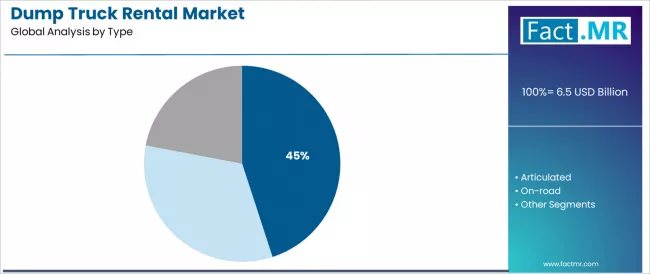
| Segment | 2025 to 2035 Outlook |
|---|---|
| Rigid | Leader in 2025 with 45.0% market share; likely to maintain leadership through 2035. Dominant use across construction, mining, and industrial applications due to robust design, mature rental networks, and versatile operational capabilities. Momentum: steady-to-strong. Watchouts: competition from articulated models in specialized applications. |
| Articulated | Strong performance with 35.0% market share, benefiting from superior maneuverability and off-road capabilities required for challenging terrain applications. Enhanced traction control and load distribution advantages driving adoption in mining and specialized construction projects. Momentum: rising. Watchouts: higher rental costs limiting broader adoption. |
| On-road | Specialized segment with 20.0% market share focused on urban construction and material transport applications. Growing demand for road-compliant dump truck rental services supporting infrastructure development and urban construction projects. Momentum: moderate growth via urban development expansion. Watchouts: regulatory restrictions affecting operational flexibility. |
Dump Truck Rental Market Analysis by Payload
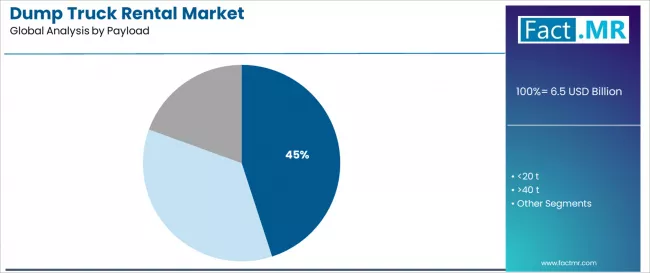
| Segment | 2025 to 2035 Outlook |
|---|---|
| 20-40 t | At 45.0%, largest payload segment in 2025 with established rental integration across construction and mining applications. Balanced capacity and operational efficiency making it preferred choice for diverse project requirements. Momentum: steady growth driven by construction activity and project diversity. Watchouts: competition from specialized payload categories. |
| <20 t | Important segment with 30.0% share serving smaller construction projects and urban applications. Cost-effective rental solutions for projects with limited space or weight restrictions. Momentum: moderate growth through small-scale construction expansion and urban development. Watchouts: limited capacity restricting larger project applications. |
| >40 t | Heavy-duty segment with 25.0% share focused on large-scale mining and major construction projects. Growing demand for high-capacity rental solutions supporting infrastructure development and resource extraction operations. Momentum: strong growth via large-scale project expansion. Watchouts: regulatory weight restrictions and transportation limitations. |
Dump Truck Rental Market Analysis by End Use
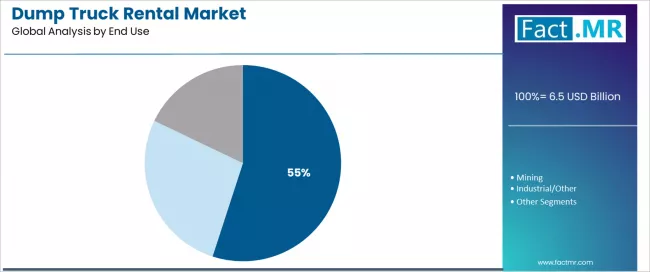
| Segment | Status & Outlook 2025-2035 |
|---|---|
| Construction | Dominant segment in 2025 with 55.0% share across residential, commercial, and infrastructure projects. Established rental practices, diverse equipment requirements, and project-based demand patterns. Momentum: steady growth driven by global construction activity and infrastructure investment. Watchouts: economic cycles affecting project timing and equipment demand. |
| Mining | Significant segment with 30.0% share requiring heavy-duty dump truck rental services for extraction and material handling operations. Growing demand for specialized equipment rental supporting resource development projects. Momentum: strong growth through resource sector expansion and mining project development. Watchouts: commodity price volatility affecting mining investment. |
| Industrial/Other | Specialized segment with 15.0% share serving waste management, manufacturing, and other industrial applications. Growing demand for flexible rental solutions supporting diverse operational requirements. Momentum: moderate growth via industrial diversification and specialized application expansion. Watchouts: competition from specialized equipment categories. |
DRIVERS
| DRIVERS | RESTRAINTS | KEY TRENDS |
|---|---|---|
| Construction Industry Growth Expanding construction activities across residential, commercial, and infrastructure sectors driving demand for flexible dump truck rental services that provide access to advanced equipment without capital investment requirements. Capital Optimization Strategies Growing adoption of equipment rental models enabling construction companies to optimize capital allocation while accessing modern dump truck fleets that meet diverse project requirements and operational standards. Project-Based Demand Patterns Variable project cycles and regional construction patterns creating demand for flexible rental solutions that align equipment availability with specific project timelines and operational requirements. | Equipment Acquisition Costs Rising equipment purchase prices and maintenance costs affecting rental provider profitability and pricing strategies for dump truck rental services. Regulatory Compliance Complexity Complex regulatory requirements across jurisdictions affecting equipment specifications, operator certification, and compliance costs for rental service providers. Seasonal Utilization Variations Seasonal construction patterns affecting equipment utilization rates and rental provider revenue predictability across different geographic markets. | Technology Integration Integration of advanced telematics systems, fuel-efficient engines, and automated control technologies enhancing rental equipment performance and operational efficiency. Fleet Modernization Continuous fleet modernization with latest dump truck technologies, improved fuel efficiency, and enhanced safety features compared to traditional equipment ownership models. Digital Rental Platforms Development of digital rental platforms and equipment management systems providing enhanced booking capabilities, real-time availability tracking, and operational optimization for rental services. |
Analysis of Dump Truck Rental Market by Key Countries
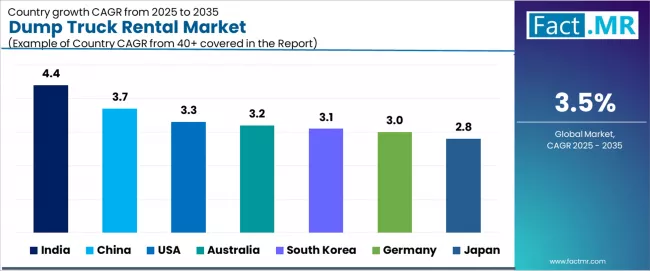
| Country | CAGR (2025-2035) |
|---|---|
| India | 4.4% |
| China | 3.7% |
| USA | 3.3% |
| Australia | 3.2% |
| South Korea | 3.1% |
| Germany | 3.0% |
| Japan | 2.8% |
India Leads Global Market Growth with Construction Excellence
Revenue from dump truck rental in India is projected to exhibit strong growth driven by expanding infrastructure development programs and comprehensive construction industry modernization creating opportunities for equipment rental providers across residential construction, commercial development, and major infrastructure projects.
The country's developing construction capabilities and expanding infrastructure investment are creating demand for both conventional and heavy-duty dump truck rental services. Major construction companies are establishing partnerships with rental providers to support large-scale development operations and meet growing demand for efficient material handling solutions.
Infrastructure development programs are supporting widespread adoption of advanced dump truck rental services across construction operations, driving demand for high-quality equipment rental solutions. Construction industry modernization initiatives and specialized project development are creating opportunities for rental providers requiring reliable equipment performance and cost-effective dump truck solutions. Commercial construction growth and infrastructure project development are facilitating adoption of heavy-duty dump truck rental services throughout major metropolitan regions.
China Demonstrates Strong Market Potential with Construction Processing Growth
Revenue from dump truck rental in China is expanding supported by extensive construction industry development and comprehensive infrastructure project implementation creating demand for reliable dump truck rental services across diverse construction categories and specialized development segments.
The country's dominant construction position and expanding infrastructure capabilities are driving demand for rental solutions that provide consistent performance while supporting cost-effective project execution requirements. Construction contractors and project developers are investing in rental partnerships to support growing construction operations and infrastructure development demand.
Construction operations expansion and infrastructure development capability enhancement are creating opportunities for dump truck rental services across diverse construction segments requiring reliable equipment availability and competitive rental pricing. Development modernization and construction technology advancement are driving investments in rental service relationships supporting performance requirements throughout major development regions. Infrastructure construction growth and specialized project development programs are enhancing demand for construction-grade dump truck rental services throughout project development areas.
USA Maintains Strong Position with Equipment Rental Innovation
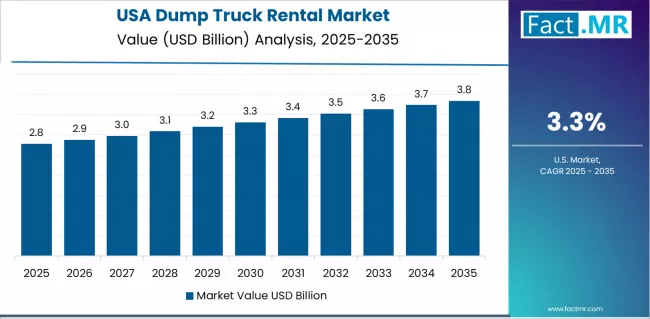
Demand for dump truck rental in USA is projected to grow supported by the country's established construction industry base and infrastructure development projects requiring advanced dump truck rental systems for construction operations and material handling applications. American construction companies are implementing rental strategies that support operational efficiency, project flexibility, and comprehensive cost management protocols. The market is characterized by focus on operational excellence, equipment performance, and compliance with construction industry safety standards.
Construction industry investments are prioritizing advanced rental services that demonstrate superior equipment reliability and performance while meeting American construction standards. Equipment rental leadership programs and operational excellence initiatives are driving adoption of precision-engineered dump truck rental services that support advanced construction systems and project optimization. Research and development programs for construction efficiency are facilitating adoption of specialized rental techniques throughout major construction centers.
Australia Expands Market with Construction Innovation
Revenue from dump truck rental in Australia is growing driven by advanced construction industry development programs and increasing infrastructure technology innovation creating opportunities for dump truck rental providers serving both construction operations and mining project contractors. The country's extensive resource development base and expanding construction awareness are creating demand for dump truck rental services that support diverse performance requirements while maintaining operational efficiency standards. Construction companies and mining service providers are developing rental strategies to support operational efficiency and regulatory compliance.
Advanced construction development programs and dump truck rental services are facilitating adoption of equipment rental solutions capable of supporting diverse operational requirements and competitive performance standards. Construction industry innovation and performance-focused development programs are enhancing demand for construction-grade dump truck rental services that support operational efficiency and equipment reliability. Construction market expansion and specialized project development are creating opportunities for advanced dump truck rental capabilities across Australian construction and mining facilities.
Germany Focuses on Premium Equipment Rental
Demand for dump truck rental in Germany is projected to grow driven by premium construction industry excellence and specialized dump truck rental capabilities supporting advanced construction development and comprehensive infrastructure applications. The country's established construction tradition and growing performance construction market segments are creating demand for high-quality dump truck rental services that support operational performance and construction standards. Construction companies and rental service providers are maintaining comprehensive development capabilities to support diverse construction requirements.
Premium construction development and specialized dump truck rental programs are supporting demand for construction-grade equipment rental services that meet contemporary performance and reliability standards. Infrastructure development and performance-focused construction programs are creating opportunities for specialized dump truck rental services that provide comprehensive construction support. Development modernization and construction quality enhancement programs are facilitating adoption of advanced rental capabilities throughout major construction regions.
South Korea Focuses on Advanced Construction Development
Demand for dump truck rental in South Korea is projected to grow at 3.1% CAGR driven by advanced construction industry excellence and specialized dump truck rental capabilities supporting infrastructure development and comprehensive construction applications. The country's established construction tradition and growing performance construction market segments are creating demand for high-quality dump truck rental services that support operational performance and construction standards.
Advanced construction development and specialized dump truck rental programs are supporting demand for construction-grade equipment rental services that meet contemporary performance and reliability standards. Infrastructure development and performance-focused construction programs are creating opportunities for specialized dump truck rental services that provide comprehensive construction support. Development modernization and construction quality enhancement programs are facilitating adoption of advanced rental capabilities throughout major construction regions.
Japan Focuses on Precision Construction Excellence
Demand for dump truck rental in Japan is projected to grow driven by precision construction industry excellence and specialized dump truck rental capabilities supporting advanced infrastructure development and comprehensive technical applications. The country's established construction tradition and growing performance construction market segments are creating demand for high-quality dump truck rental services that support operational performance and construction standards.
Precision construction development and specialized dump truck rental programs are supporting demand for construction-grade equipment rental services that meet contemporary performance and reliability standards. Infrastructure development and performance-focused construction programs are creating opportunities for specialized dump truck rental services that provide comprehensive construction support. Development modernization and construction quality enhancement programs are facilitating adoption of advanced rental capabilities throughout major construction regions.
Europe Market Split by Rental Application
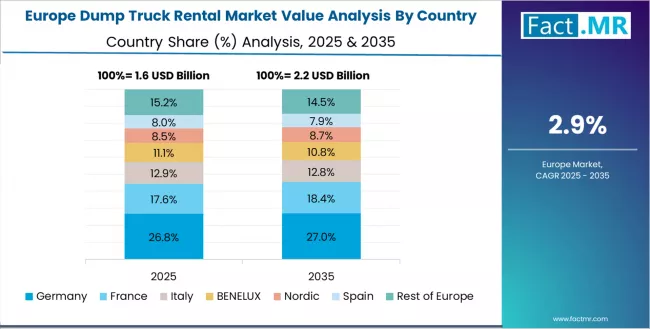
European dump truck rental operations are increasingly polarized between Western European precision rental services and Eastern European cost-competitive operations. German (USD 1,350.0 million) and UK facilities (USD 1,000.0 million) dominate premium construction and infrastructure dump truck rental processing, leveraging advanced fleet management technologies and strict maintenance protocols that command rental premiums in global markets. German rental providers maintain leadership in high-performance dump truck applications, with major construction companies driving equipment specifications that smaller rental operators must meet to access project contracts.
France (USD 820.0 million), Italy (USD 650.0 million), and Spain (USD 520.0 million) operations focus on specialized applications and regional market requirements. Rest of Europe (USD 1,160.0 million) including Eastern European operations in Poland, Hungary, and Czech Republic are capturing volume-oriented rental contracts through operational cost advantages and EU regulatory compliance, particularly in standard dump truck equipment for construction applications.
The regulatory environment presents both opportunities and constraints. EU equipment safety regulations and construction directives create barriers for non-compliant rental fleets but establish quality standards that favor established European rental providers over imports. Brexit has fragmented UK sourcing from EU suppliers, creating opportunities for direct relationships between rental providers and British construction companies.
Fleet consolidation accelerates as rental providers seek economies of scale to absorb rising fuel costs and maintenance expenses. Vertical integration increases, with major construction companies establishing preferred partnerships with rental providers to secure dump truck availability and service quality. Smaller rental operators face pressure to specialize in niche applications or risk displacement by larger, more efficient operations serving mainstream construction rental requirements.
Premium Quality Standards Define Japanese Market Dynamics
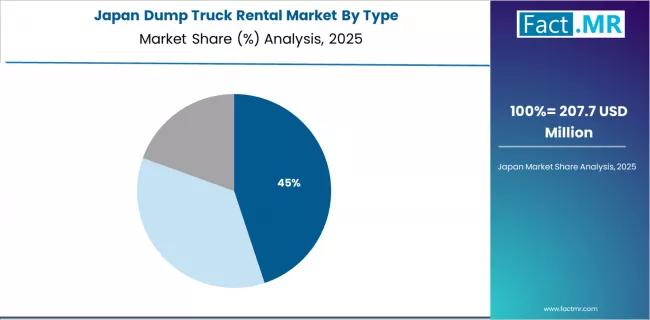
Japanese dump truck rental operations reflect the country's exacting quality standards and construction precision expectations. Major construction companies maintain rigorous rental provider qualification processes that often exceed international standards, requiring extensive fleet documentation, equipment testing protocols, and facility audits that can take 12-18 months to complete. This creates high barriers for new rental providers but ensures consistent equipment quality that supports premium construction project positioning.
The Japanese market demonstrates unique application preferences with Construction accounting for 55.0%, Mining 25.0%, and Industrial applications 20.0%. Companies require specific hauling capacity ratios and operational performance specifications that differ from Western applications, driving demand for customized rental fleet capabilities.
Japanese market demonstrates unique type preferences with Rigid dump trucks accounting for 50.0%, Articulated units 30.0%, and On-road models 20.0%. Companies require specific payload configurations and performance specifications that differ from Western applications, driving demand for customized equipment capabilities.
Regulatory oversight emphasizes comprehensive construction equipment management and traceability requirements that surpass most international standards. The equipment registration system requires detailed maintenance records and operational history, creating advantages for rental providers with transparent fleet management systems and comprehensive documentation capabilities.
Fleet management focuses on relationship-based partnerships rather than purely transactional rental agreements. Japanese companies typically maintain long-term rental provider relationships spanning decades, with annual contract negotiations emphasizing equipment reliability and service consistency over price competition alone. This stability supports investment in specialized rental fleets tailored to Japanese construction specifications.
Market Dynamics Drive Innovation in South Korea
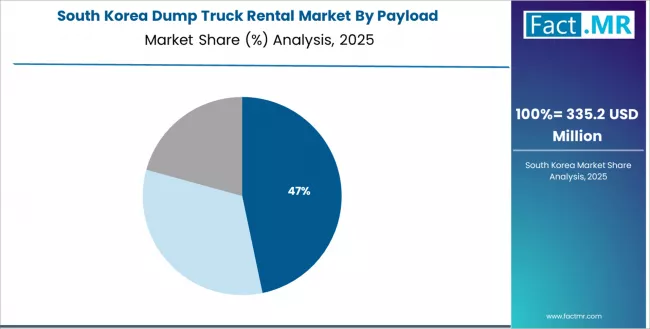
South Korean dump truck rental operations reflect the country's advanced construction sector and infrastructure-oriented business model. Major construction companies drive sophisticated equipment procurement strategies, establishing direct relationships with global rental providers to secure consistent equipment quality and competitive pricing for their construction and infrastructure operations targeting both domestic and international markets.
The Korean market demonstrates strength in application distribution with Construction accounting for 60.0%, Mining 25.0%, and Industrial applications 15.0%. This construction-focused approach creates demand for specific performance specifications that differ from Western applications, requiring rental providers to adapt equipment selection and operational support techniques.
Regulatory frameworks emphasize construction equipment safety and operational traceability, with Korean construction administration standards often exceeding international requirements. This creates barriers for smaller construction suppliers but benefits established rental providers who can demonstrate compliance capabilities. The regulatory environment particularly favors rental operators with comprehensive certification and fleet documentation systems.
Fleet efficiency remains critical given Korea's geographic limitations and equipment import dependence. Rental companies increasingly pursue long-term agreements with equipment manufacturers in United States, Germany, and Japan to ensure reliable access to advanced dump truck models while managing foreign exchange risks. Technical logistics investments support equipment quality preservation during extended shipping periods.
The market faces pressure from rising operational costs and competition from lower-cost regional rental providers, driving technology investments and consolidation among smaller operators. The premium positioning of Korean construction projects internationally continues to support demand for high-quality dump truck rental services that meet stringent operational specifications.
Competitive Landscape of Dump Truck Rental Market
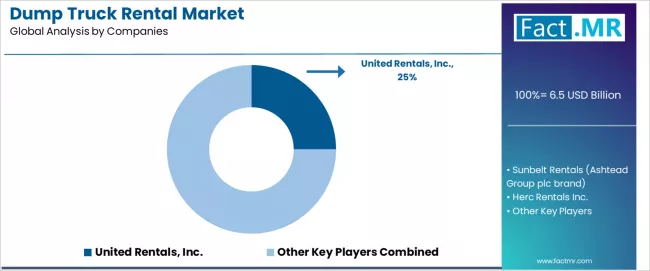
Profit pools are consolidating upstream in scaled equipment procurement and fleet management systems and downstream in value-added specialized rental services for construction, mining, and infrastructure applications where equipment availability, maintenance reliability, and operational support command premiums. Value is migrating from basic equipment rental transactions to comprehensive service packages with application-specific equipment where technical expertise and service quality drive competitive advantage.
Several archetypes set the pace: global equipment rental integrators defending share through fleet scale and service reliability; multi-application providers that manage complexity and serve diverse project requirements; specialized construction rental developers with project expertise and construction industry relationships; and performance-driven suppliers pulling volume in premium construction and infrastructure applications.
Switching costs including equipment qualification, project integration, performance validation provide stability for incumbents, while market expansion and regulatory changes reopen opportunities for diversified providers. Consolidation and service integration continue; digital platforms emerge in standard rental categories while specialized applications remain relationship led.
Focus areas: lock construction and infrastructure pipelines with project-specific equipment and service level agreements; establish multi-application rental capabilities and technical support; develop specialized dump truck rental solutions with performance guarantees.
| Stakeholder Type | Primary Advantage | Repeatable Plays |
|---|---|---|
| Global equipment rental integrators | Scale, fleet integration, service reliability | Long-term contracts, equipment specifications, co-development with construction/mining |
| Multi-application providers | Equipment diversification, application expertise, service flexibility | Multi-project serving, technical support, service assurance across segments |
| Specialized construction rental developers | Project expertise and industry relationships | Custom equipment solutions, operational efficiency, performance service agreements |
| Performance suppliers | Application-focused demand and specialized service | Technical performance claims, specialized equipment, application optimization |
| Regional distributors & platforms | Technical support for mid-tier construction companies | Equipment selection, smaller projects, technical service |
Key Players in the Dump Truck Rental Market
- United Rentals, Inc.
- Sunbelt Rentals (Ashtead Group plc brand)
- Herc Rentals Inc.
- Ashtead Group plc
- Komatsu Ltd. (Komatsu Rental division)
- Caterpillar Inc. (Caterpillar Rental Services)
- Volvo Construction Equipment Rental
- Terex Corporation
- Hitachi Construction Machinery Co., Ltd.
- SANY Group Co., Ltd.
- XCMG Group
- Doosan Bobcat Inc.
- Kiloutou S.A.S.
- Loxam S.A.
- Kanamoto Co., Ltd.
Scope of the Report
| Items | Values |
|---|---|
| Quantitative Units (2025) | USD 6,500.0 Million |
| Type | Rigid, Articulated, On-road |
| Payload | <20 t, 20-40 t, >40 t |
| End Use | Construction, Mining, Industrial/Other |
| Regions Covered | North America, Europe, Asia Pacific, Latin America, Middle East & Africa |
| Countries Covered | United States, Germany, China, Japan, India, South Korea, Australia, and other 40+ countries |
| Key Companies Profiled | United Rentals, Sunbelt, Herc, Ashtead, Komatsu Rental, Caterpillar Rental, Volvo CE Rental, Terex, Hitachi, SANY, XCMG, Doosan/Bobcat, Kiloutou, Loxam, Kanamoto |
| Additional Attributes | Dollar rental revenue by type/payload/end use, regional demand (NA, EU, APAC), competitive landscape, equipment utilization patterns, fleet management integration, and advanced technology innovations driving operational efficiency, service enhancement, and cost optimization |
Dump Truck Rental Market Segmentation
-
By Type :
- Rigid
- Articulated
- On-road
-
By Payload :
- <20 t
- 20-40 t
- 40 t
-
By End Use :
- Construction
- Mining
- Industrial/Other
-
By Region :
- North America
- Europe
- Asia Pacific
- Latin America
- Middle East & Africa
Table of Content
- Executive Summary
- Global Market Outlook
- Demand to side Trends
- Supply to side Trends
- Technology Roadmap Analysis
- Analysis and Recommendations
- Market Overview
- Market Coverage / Taxonomy
- Market Definition / Scope / Limitations
- Market Background
- Market Dynamics
- Drivers
- Restraints
- Opportunity
- Trends
- Scenario Forecast
- Demand in Optimistic Scenario
- Demand in Likely Scenario
- Demand in Conservative Scenario
- Opportunity Map Analysis
- Product Life Cycle Analysis
- Supply Chain Analysis
- Investment Feasibility Matrix
- Value Chain Analysis
- PESTLE and Porter’s Analysis
- Regulatory Landscape
- Regional Parent Market Outlook
- Production and Consumption Statistics
- Import and Export Statistics
- Market Dynamics
- Global Market Analysis 2020 to 2024 and Forecast, 2025 to 2035
- Historical Market Size Value (USD Million) Analysis, 2020 to 2024
- Current and Future Market Size Value (USD Million) Projections, 2025 to 2035
- Y to o to Y Growth Trend Analysis
- Absolute $ Opportunity Analysis
- Global Market Pricing Analysis 2020 to 2024 and Forecast 2025 to 2035
- Global Market Analysis 2020 to 2024 and Forecast 2025 to 2035, By Type
- Introduction / Key Findings
- Historical Market Size Value (USD Million) Analysis By Type , 2020 to 2024
- Current and Future Market Size Value (USD Million) Analysis and Forecast By Type , 2025 to 2035
- Rigid
- Articulated
- On-road
- Y to o to Y Growth Trend Analysis By Type , 2020 to 2024
- Absolute $ Opportunity Analysis By Type , 2025 to 2035
- Global Market Analysis 2020 to 2024 and Forecast 2025 to 2035, By Payload
- Introduction / Key Findings
- Historical Market Size Value (USD Million) Analysis By Payload, 2020 to 2024
- Current and Future Market Size Value (USD Million) Analysis and Forecast By Payload, 2025 to 2035
- 20-40 t
- <20 t
- >40 t
- Y to o to Y Growth Trend Analysis By Payload, 2020 to 2024
- Absolute $ Opportunity Analysis By Payload, 2025 to 2035
- Global Market Analysis 2020 to 2024 and Forecast 2025 to 2035, By End Use
- Introduction / Key Findings
- Historical Market Size Value (USD Million) Analysis By End Use, 2020 to 2024
- Current and Future Market Size Value (USD Million) Analysis and Forecast By End Use, 2025 to 2035
- Construction
- Mining
- Industrial/Other
- Y to o to Y Growth Trend Analysis By End Use, 2020 to 2024
- Absolute $ Opportunity Analysis By End Use, 2025 to 2035
- Global Market Analysis 2020 to 2024 and Forecast 2025 to 2035, By Region
- Introduction
- Historical Market Size Value (USD Million) Analysis By Region, 2020 to 2024
- Current Market Size Value (USD Million) Analysis and Forecast By Region, 2025 to 2035
- North America
- Latin America
- Western Europe
- Eastern Europe
- East Asia
- South Asia and Pacific
- Middle East & Africa
- Market Attractiveness Analysis By Region
- North America Market Analysis 2020 to 2024 and Forecast 2025 to 2035, By Country
- Historical Market Size Value (USD Million) Trend Analysis By Market Taxonomy, 2020 to 2024
- Market Size Value (USD Million) Forecast By Market Taxonomy, 2025 to 2035
- By Country
- USA
- Canada
- Mexico
- By Type
- By Payload
- By End Use
- By Country
- Market Attractiveness Analysis
- By Country
- By Type
- By Payload
- By End Use
- Key Takeaways
- Latin America Market Analysis 2020 to 2024 and Forecast 2025 to 2035, By Country
- Historical Market Size Value (USD Million) Trend Analysis By Market Taxonomy, 2020 to 2024
- Market Size Value (USD Million) Forecast By Market Taxonomy, 2025 to 2035
- By Country
- Brazil
- Chile
- Rest of Latin America
- By Type
- By Payload
- By End Use
- By Country
- Market Attractiveness Analysis
- By Country
- By Type
- By Payload
- By End Use
- Key Takeaways
- Western Europe Market Analysis 2020 to 2024 and Forecast 2025 to 2035, By Country
- Historical Market Size Value (USD Million) Trend Analysis By Market Taxonomy, 2020 to 2024
- Market Size Value (USD Million) Forecast By Market Taxonomy, 2025 to 2035
- By Country
- Germany
- UK
- Italy
- Spain
- France
- Nordic
- BENELUX
- Rest of Western Europe
- By Type
- By Payload
- By End Use
- By Country
- Market Attractiveness Analysis
- By Country
- By Type
- By Payload
- By End Use
- Key Takeaways
- Eastern Europe Market Analysis 2020 to 2024 and Forecast 2025 to 2035, By Country
- Historical Market Size Value (USD Million) Trend Analysis By Market Taxonomy, 2020 to 2024
- Market Size Value (USD Million) Forecast By Market Taxonomy, 2025 to 2035
- By Country
- Russia
- Poland
- Hungary
- Balkan & Baltic
- Rest of Eastern Europe
- By Type
- By Payload
- By End Use
- By Country
- Market Attractiveness Analysis
- By Country
- By Type
- By Payload
- By End Use
- Key Takeaways
- East Asia Market Analysis 2020 to 2024 and Forecast 2025 to 2035, By Country
- Historical Market Size Value (USD Million) Trend Analysis By Market Taxonomy, 2020 to 2024
- Market Size Value (USD Million) Forecast By Market Taxonomy, 2025 to 2035
- By Country
- China
- Japan
- South Korea
- By Type
- By Payload
- By End Use
- By Country
- Market Attractiveness Analysis
- By Country
- By Type
- By Payload
- By End Use
- Key Takeaways
- South Asia and Pacific Market Analysis 2020 to 2024 and Forecast 2025 to 2035, By Country
- Historical Market Size Value (USD Million) Trend Analysis By Market Taxonomy, 2020 to 2024
- Market Size Value (USD Million) Forecast By Market Taxonomy, 2025 to 2035
- By Country
- India
- ASEAN
- Australia & New Zealand
- Rest of South Asia and Pacific
- By Type
- By Payload
- By End Use
- By Country
- Market Attractiveness Analysis
- By Country
- By Type
- By Payload
- By End Use
- Key Takeaways
- Middle East & Africa Market Analysis 2020 to 2024 and Forecast 2025 to 2035, By Country
- Historical Market Size Value (USD Million) Trend Analysis By Market Taxonomy, 2020 to 2024
- Market Size Value (USD Million) Forecast By Market Taxonomy, 2025 to 2035
- By Country
- Kingdom of Saudi Arabia
- Other GCC Countries
- Turkiye
- South Africa
- Other African Union
- Rest of Middle East & Africa
- By Type
- By Payload
- By End Use
- By Country
- Market Attractiveness Analysis
- By Country
- By Type
- By Payload
- By End Use
- Key Takeaways
- Key Countries Market Analysis
- USA
- Pricing Analysis
- Market Share Analysis, 2024
- By Type
- By Payload
- By End Use
- Canada
- Pricing Analysis
- Market Share Analysis, 2024
- By Type
- By Payload
- By End Use
- Mexico
- Pricing Analysis
- Market Share Analysis, 2024
- By Type
- By Payload
- By End Use
- Brazil
- Pricing Analysis
- Market Share Analysis, 2024
- By Type
- By Payload
- By End Use
- Chile
- Pricing Analysis
- Market Share Analysis, 2024
- By Type
- By Payload
- By End Use
- Germany
- Pricing Analysis
- Market Share Analysis, 2024
- By Type
- By Payload
- By End Use
- UK
- Pricing Analysis
- Market Share Analysis, 2024
- By Type
- By Payload
- By End Use
- Italy
- Pricing Analysis
- Market Share Analysis, 2024
- By Type
- By Payload
- By End Use
- Spain
- Pricing Analysis
- Market Share Analysis, 2024
- By Type
- By Payload
- By End Use
- France
- Pricing Analysis
- Market Share Analysis, 2024
- By Type
- By Payload
- By End Use
- India
- Pricing Analysis
- Market Share Analysis, 2024
- By Type
- By Payload
- By End Use
- ASEAN
- Pricing Analysis
- Market Share Analysis, 2024
- By Type
- By Payload
- By End Use
- Australia & New Zealand
- Pricing Analysis
- Market Share Analysis, 2024
- By Type
- By Payload
- By End Use
- China
- Pricing Analysis
- Market Share Analysis, 2024
- By Type
- By Payload
- By End Use
- Japan
- Pricing Analysis
- Market Share Analysis, 2024
- By Type
- By Payload
- By End Use
- South Korea
- Pricing Analysis
- Market Share Analysis, 2024
- By Type
- By Payload
- By End Use
- Russia
- Pricing Analysis
- Market Share Analysis, 2024
- By Type
- By Payload
- By End Use
- Poland
- Pricing Analysis
- Market Share Analysis, 2024
- By Type
- By Payload
- By End Use
- Hungary
- Pricing Analysis
- Market Share Analysis, 2024
- By Type
- By Payload
- By End Use
- Kingdom of Saudi Arabia
- Pricing Analysis
- Market Share Analysis, 2024
- By Type
- By Payload
- By End Use
- Turkiye
- Pricing Analysis
- Market Share Analysis, 2024
- By Type
- By Payload
- By End Use
- South Africa
- Pricing Analysis
- Market Share Analysis, 2024
- By Type
- By Payload
- By End Use
- USA
- Market Structure Analysis
- Competition Dashboard
- Competition Benchmarking
- Market Share Analysis of Top Players
- By Regional
- By Type
- By Payload
- By End Use
- Competition Analysis
- Competition Deep Dive
- Value (USD Million)ed Rentals, Inc.
- Overview
- Product Portfolio
- Profitability by Market Segments (Product/Age /Sales Channel/Region)
- Sales Footprint
- Strategy Overview
- Marketing Strategy
- Product Strategy
- Channel Strategy
- Sunbelt Rentals (Ashtead Group plc brand)
- Herc Rentals Inc.
- Ashtead Group plc
- Komatsu Ltd. (Komatsu Rental division)
- Caterpillar Inc. (Caterpillar Rental Services)
- Volvo Construction Equipment Rental
- Terex Corporation
- Hitachi Construction Machinery Co., Ltd.
- SANY Group Co., Ltd.
- XCMG Group
- Doosan Bobcat Inc.
- Kiloutou S.A.S.
- Loxam S.A.
- Kanamoto Co., Ltd.
- Value (USD Million)ed Rentals, Inc.
- Competition Deep Dive
- Assumptions & Acronyms Used
- Research Methodology
List Of Table
- Table 1: Global Market Value (USD Million) Forecast by Region, 2020 to 2035
- Table 2: Global Market Value (USD Million) Forecast by Type , 2020 to 2035
- Table 3: Global Market Value (USD Million) Forecast by Payload, 2020 to 2035
- Table 4: Global Market Value (USD Million) Forecast by End Use, 2020 to 2035
- Table 5: North America Market Value (USD Million) Forecast by Country, 2020 to 2035
- Table 6: North America Market Value (USD Million) Forecast by Type , 2020 to 2035
- Table 7: North America Market Value (USD Million) Forecast by Payload, 2020 to 2035
- Table 8: North America Market Value (USD Million) Forecast by End Use, 2020 to 2035
- Table 9: Latin America Market Value (USD Million) Forecast by Country, 2020 to 2035
- Table 10: Latin America Market Value (USD Million) Forecast by Type , 2020 to 2035
- Table 11: Latin America Market Value (USD Million) Forecast by Payload, 2020 to 2035
- Table 12: Latin America Market Value (USD Million) Forecast by End Use, 2020 to 2035
- Table 13: Western Europe Market Value (USD Million) Forecast by Country, 2020 to 2035
- Table 14: Western Europe Market Value (USD Million) Forecast by Type , 2020 to 2035
- Table 15: Western Europe Market Value (USD Million) Forecast by Payload, 2020 to 2035
- Table 16: Western Europe Market Value (USD Million) Forecast by End Use, 2020 to 2035
- Table 17: Eastern Europe Market Value (USD Million) Forecast by Country, 2020 to 2035
- Table 18: Eastern Europe Market Value (USD Million) Forecast by Type , 2020 to 2035
- Table 19: Eastern Europe Market Value (USD Million) Forecast by Payload, 2020 to 2035
- Table 20: Eastern Europe Market Value (USD Million) Forecast by End Use, 2020 to 2035
- Table 21: East Asia Market Value (USD Million) Forecast by Country, 2020 to 2035
- Table 22: East Asia Market Value (USD Million) Forecast by Type , 2020 to 2035
- Table 23: East Asia Market Value (USD Million) Forecast by Payload, 2020 to 2035
- Table 24: East Asia Market Value (USD Million) Forecast by End Use, 2020 to 2035
- Table 25: South Asia and Pacific Market Value (USD Million) Forecast by Country, 2020 to 2035
- Table 26: South Asia and Pacific Market Value (USD Million) Forecast by Type , 2020 to 2035
- Table 27: South Asia and Pacific Market Value (USD Million) Forecast by Payload, 2020 to 2035
- Table 28: South Asia and Pacific Market Value (USD Million) Forecast by End Use, 2020 to 2035
- Table 29: Middle East & Africa Market Value (USD Million) Forecast by Country, 2020 to 2035
- Table 30: Middle East & Africa Market Value (USD Million) Forecast by Type , 2020 to 2035
- Table 31: Middle East & Africa Market Value (USD Million) Forecast by Payload, 2020 to 2035
- Table 32: Middle East & Africa Market Value (USD Million) Forecast by End Use, 2020 to 2035
List Of Figures
- Figure 1: Global Market Pricing Analysis
- Figure 2: Global Market Value (USD Million) Forecast 2020-2035
- Figure 3: Global Market Value Share and BPS Analysis by Type , 2025 and 2035
- Figure 4: Global Market Y to o to Y Growth Comparison by Type , 2025-2035
- Figure 5: Global Market Attractiveness Analysis by Type
- Figure 6: Global Market Value Share and BPS Analysis by Payload, 2025 and 2035
- Figure 7: Global Market Y to o to Y Growth Comparison by Payload, 2025-2035
- Figure 8: Global Market Attractiveness Analysis by Payload
- Figure 9: Global Market Value Share and BPS Analysis by End Use, 2025 and 2035
- Figure 10: Global Market Y to o to Y Growth Comparison by End Use, 2025-2035
- Figure 11: Global Market Attractiveness Analysis by End Use
- Figure 12: Global Market Value (USD Million) Share and BPS Analysis by Region, 2025 and 2035
- Figure 13: Global Market Y to o to Y Growth Comparison by Region, 2025-2035
- Figure 14: Global Market Attractiveness Analysis by Region
- Figure 15: North America Market Incremental Dollar Opportunity, 2025-2035
- Figure 16: Latin America Market Incremental Dollar Opportunity, 2025-2035
- Figure 17: Western Europe Market Incremental Dollar Opportunity, 2025-2035
- Figure 18: Eastern Europe Market Incremental Dollar Opportunity, 2025-2035
- Figure 19: East Asia Market Incremental Dollar Opportunity, 2025-2035
- Figure 20: South Asia and Pacific Market Incremental Dollar Opportunity, 2025-2035
- Figure 21: Middle East & Africa Market Incremental Dollar Opportunity, 2025-2035
- Figure 22: North America Market Value Share and BPS Analysis by Country, 2025 and 2035
- Figure 23: North America Market Value Share and BPS Analysis by Type , 2025 and 2035
- Figure 24: North America Market Y to o to Y Growth Comparison by Type , 2025-2035
- Figure 25: North America Market Attractiveness Analysis by Type
- Figure 26: North America Market Value Share and BPS Analysis by Payload, 2025 and 2035
- Figure 27: North America Market Y to o to Y Growth Comparison by Payload, 2025-2035
- Figure 28: North America Market Attractiveness Analysis by Payload
- Figure 29: North America Market Value Share and BPS Analysis by End Use, 2025 and 2035
- Figure 30: North America Market Y to o to Y Growth Comparison by End Use, 2025-2035
- Figure 31: North America Market Attractiveness Analysis by End Use
- Figure 32: Latin America Market Value Share and BPS Analysis by Country, 2025 and 2035
- Figure 33: Latin America Market Value Share and BPS Analysis by Type , 2025 and 2035
- Figure 34: Latin America Market Y to o to Y Growth Comparison by Type , 2025-2035
- Figure 35: Latin America Market Attractiveness Analysis by Type
- Figure 36: Latin America Market Value Share and BPS Analysis by Payload, 2025 and 2035
- Figure 37: Latin America Market Y to o to Y Growth Comparison by Payload, 2025-2035
- Figure 38: Latin America Market Attractiveness Analysis by Payload
- Figure 39: Latin America Market Value Share and BPS Analysis by End Use, 2025 and 2035
- Figure 40: Latin America Market Y to o to Y Growth Comparison by End Use, 2025-2035
- Figure 41: Latin America Market Attractiveness Analysis by End Use
- Figure 42: Western Europe Market Value Share and BPS Analysis by Country, 2025 and 2035
- Figure 43: Western Europe Market Value Share and BPS Analysis by Type , 2025 and 2035
- Figure 44: Western Europe Market Y to o to Y Growth Comparison by Type , 2025-2035
- Figure 45: Western Europe Market Attractiveness Analysis by Type
- Figure 46: Western Europe Market Value Share and BPS Analysis by Payload, 2025 and 2035
- Figure 47: Western Europe Market Y to o to Y Growth Comparison by Payload, 2025-2035
- Figure 48: Western Europe Market Attractiveness Analysis by Payload
- Figure 49: Western Europe Market Value Share and BPS Analysis by End Use, 2025 and 2035
- Figure 50: Western Europe Market Y to o to Y Growth Comparison by End Use, 2025-2035
- Figure 51: Western Europe Market Attractiveness Analysis by End Use
- Figure 52: Eastern Europe Market Value Share and BPS Analysis by Country, 2025 and 2035
- Figure 53: Eastern Europe Market Value Share and BPS Analysis by Type , 2025 and 2035
- Figure 54: Eastern Europe Market Y to o to Y Growth Comparison by Type , 2025-2035
- Figure 55: Eastern Europe Market Attractiveness Analysis by Type
- Figure 56: Eastern Europe Market Value Share and BPS Analysis by Payload, 2025 and 2035
- Figure 57: Eastern Europe Market Y to o to Y Growth Comparison by Payload, 2025-2035
- Figure 58: Eastern Europe Market Attractiveness Analysis by Payload
- Figure 59: Eastern Europe Market Value Share and BPS Analysis by End Use, 2025 and 2035
- Figure 60: Eastern Europe Market Y to o to Y Growth Comparison by End Use, 2025-2035
- Figure 61: Eastern Europe Market Attractiveness Analysis by End Use
- Figure 62: East Asia Market Value Share and BPS Analysis by Country, 2025 and 2035
- Figure 63: East Asia Market Value Share and BPS Analysis by Type , 2025 and 2035
- Figure 64: East Asia Market Y to o to Y Growth Comparison by Type , 2025-2035
- Figure 65: East Asia Market Attractiveness Analysis by Type
- Figure 66: East Asia Market Value Share and BPS Analysis by Payload, 2025 and 2035
- Figure 67: East Asia Market Y to o to Y Growth Comparison by Payload, 2025-2035
- Figure 68: East Asia Market Attractiveness Analysis by Payload
- Figure 69: East Asia Market Value Share and BPS Analysis by End Use, 2025 and 2035
- Figure 70: East Asia Market Y to o to Y Growth Comparison by End Use, 2025-2035
- Figure 71: East Asia Market Attractiveness Analysis by End Use
- Figure 72: South Asia and Pacific Market Value Share and BPS Analysis by Country, 2025 and 2035
- Figure 73: South Asia and Pacific Market Value Share and BPS Analysis by Type , 2025 and 2035
- Figure 74: South Asia and Pacific Market Y to o to Y Growth Comparison by Type , 2025-2035
- Figure 75: South Asia and Pacific Market Attractiveness Analysis by Type
- Figure 76: South Asia and Pacific Market Value Share and BPS Analysis by Payload, 2025 and 2035
- Figure 77: South Asia and Pacific Market Y to o to Y Growth Comparison by Payload, 2025-2035
- Figure 78: South Asia and Pacific Market Attractiveness Analysis by Payload
- Figure 79: South Asia and Pacific Market Value Share and BPS Analysis by End Use, 2025 and 2035
- Figure 80: South Asia and Pacific Market Y to o to Y Growth Comparison by End Use, 2025-2035
- Figure 81: South Asia and Pacific Market Attractiveness Analysis by End Use
- Figure 82: Middle East & Africa Market Value Share and BPS Analysis by Country, 2025 and 2035
- Figure 83: Middle East & Africa Market Value Share and BPS Analysis by Type , 2025 and 2035
- Figure 84: Middle East & Africa Market Y to o to Y Growth Comparison by Type , 2025-2035
- Figure 85: Middle East & Africa Market Attractiveness Analysis by Type
- Figure 86: Middle East & Africa Market Value Share and BPS Analysis by Payload, 2025 and 2035
- Figure 87: Middle East & Africa Market Y to o to Y Growth Comparison by Payload, 2025-2035
- Figure 88: Middle East & Africa Market Attractiveness Analysis by Payload
- Figure 89: Middle East & Africa Market Value Share and BPS Analysis by End Use, 2025 and 2035
- Figure 90: Middle East & Africa Market Y to o to Y Growth Comparison by End Use, 2025-2035
- Figure 91: Middle East & Africa Market Attractiveness Analysis by End Use
- Figure 92: Global Market - Tier Structure Analysis
- Figure 93: Global Market - Company Share Analysis
- FAQs -
How big is the dump truck rental market in 2025?
The global dump truck rental market is estimated to be valued at USD 6.5 billion in 2025.
What will be the size of dump truck rental market in 2035?
The market size for the dump truck rental market is projected to reach USD 9.2 billion by 2035.
How much will be the dump truck rental market growth between 2025 and 2035?
The dump truck rental market is expected to grow at a 3.5% CAGR between 2025 and 2035.
What are the key product types in the dump truck rental market?
The key product types in dump truck rental market are rigid, articulated and on-road.
Which payload segment to contribute significant share in the dump truck rental market in 2025?
In terms of payload, 20-40 t segment to command 45.0% share in the dump truck rental market in 2025.